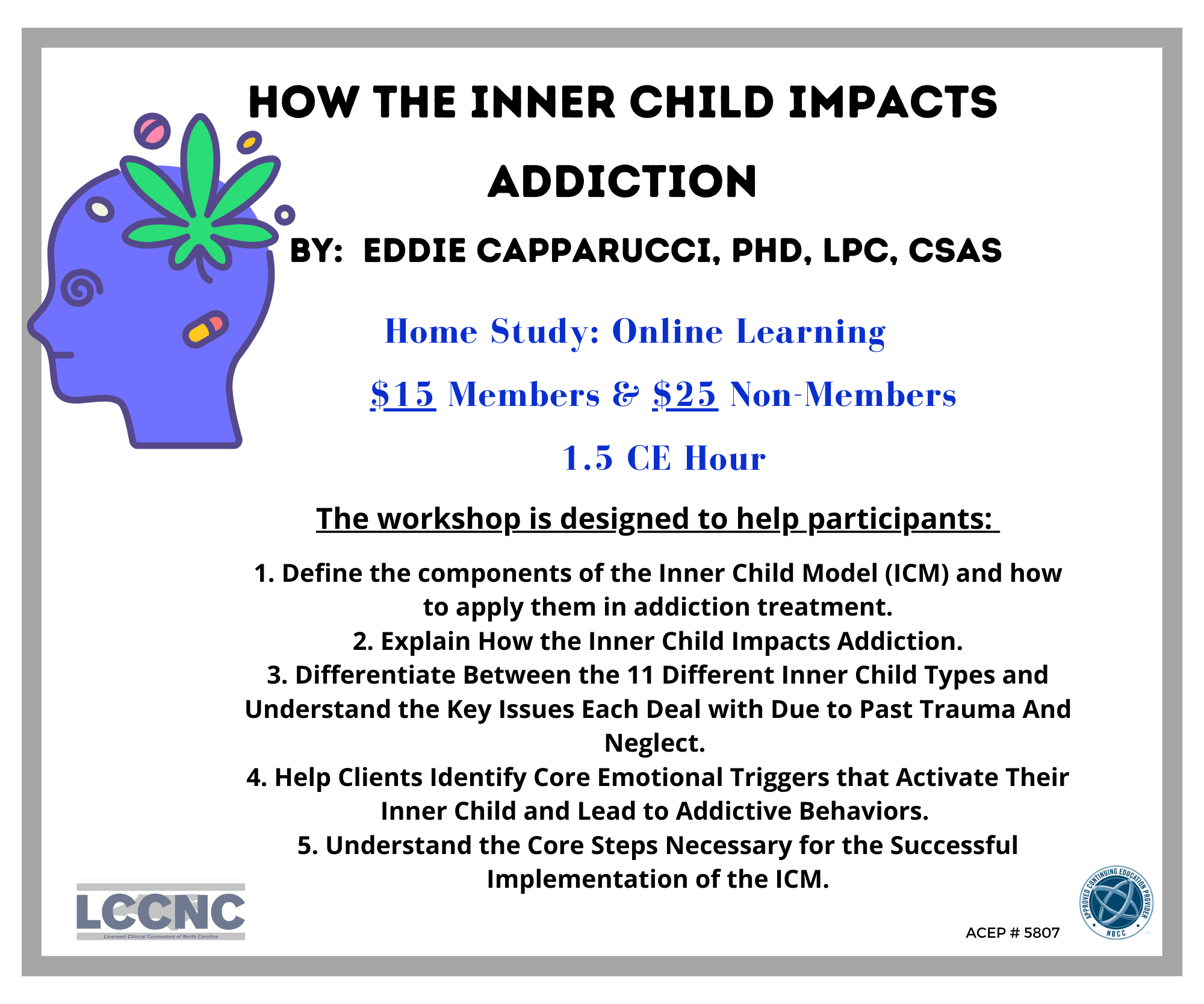Date/Time
10/14/2023 - 12/30/2040
Self-paced
Self-paced
Event Registration
Event Type(s)
Home-Study Courses
Event Description

Contact Person
Details
Program Description:
Addiction is responsible for individuals engaging in harmful behaviors that result in the erosion of self-worth, destruction of relationships, issues at school or work, as well as legal, financial, and health consequences. Many treatment methods and programs designed to treat addiction have left individuals who have tried to quit numerous times frustrated and hopeless. Individuals are locked in darkness, and relationships are destroyed.
Part of the solution to helping individuals escape the stranglehold of addiction can be found by answering a simple question â?? why? Why has addiction had a stronghold on my life? Understanding the answer to this question can empower individuals to make real and lifelong changes. And the answer to the why question can be found in the Inner Child.
Childhood Trauma/Neglect
The Inner Child Model for the Treatment of Addictions is a trauma-based model. It is based on the premise that the road to recovery from addiction goes through your childhood because many addictions are driven by past childhood trauma and neglect. Utilizing early childhood development, attachment theory, and the Adverse Childhood Events study findings, the Inner Child Model helps individuals identify childhood emotional triggers that still haunt them today.
When activated, the Inner Child will correlate current negative events too painful past emotions, thus heightening an individual's discomfort level and increasing the risk of compulsive behaviors. The Inner Child will seek to escape the current emotional distress by becoming distracted using destructive addictive behaviors. This is done to provide the Inner Child with its number one need â?? comfort.
When the Inner Child is activated, an individual struggling with addiction will compulsively turn to addictive behaviors, unaware of their Inner Child's actions and the emotions that trouble him. By becoming familiar with the child, his core emotional triggers, and the techniques necessary to comfort him, individuals can take an active role in successfully managing their addiction.
Learning Objectives:
LCCNC
605 N. Terrace Place
Morganton, NC 28655
(919) 714-9025
info@lccnc.org
www.lccnc.org
Addiction is responsible for individuals engaging in harmful behaviors that result in the erosion of self-worth, destruction of relationships, issues at school or work, as well as legal, financial, and health consequences. Many treatment methods and programs designed to treat addiction have left individuals who have tried to quit numerous times frustrated and hopeless. Individuals are locked in darkness, and relationships are destroyed.
Part of the solution to helping individuals escape the stranglehold of addiction can be found by answering a simple question â?? why? Why has addiction had a stronghold on my life? Understanding the answer to this question can empower individuals to make real and lifelong changes. And the answer to the why question can be found in the Inner Child.
Childhood Trauma/Neglect
The Inner Child Model for the Treatment of Addictions is a trauma-based model. It is based on the premise that the road to recovery from addiction goes through your childhood because many addictions are driven by past childhood trauma and neglect. Utilizing early childhood development, attachment theory, and the Adverse Childhood Events study findings, the Inner Child Model helps individuals identify childhood emotional triggers that still haunt them today.
When activated, the Inner Child will correlate current negative events too painful past emotions, thus heightening an individual's discomfort level and increasing the risk of compulsive behaviors. The Inner Child will seek to escape the current emotional distress by becoming distracted using destructive addictive behaviors. This is done to provide the Inner Child with its number one need â?? comfort.
When the Inner Child is activated, an individual struggling with addiction will compulsively turn to addictive behaviors, unaware of their Inner Child's actions and the emotions that trouble him. By becoming familiar with the child, his core emotional triggers, and the techniques necessary to comfort him, individuals can take an active role in successfully managing their addiction.
Learning Objectives:
The workshop is designed to help participants:
1. Define the components of the Inner Child Model (ICM) and how to apply them in addiction treatment.
2. Explain How the Inner Child Impacts Addiction.
3. Differentiate Between the 11 Different Inner Child Types and Understand the Key Issues Each Deal with Due to Past Trauma And Neglect.
4. Help Clients Identify Core Emotional Triggers that Activate Their Inner Child and Lead to Addictive Behaviors.
5. Understand the Core Steps Necessary for the Successful Implementation of the ICM.
LCCNC
605 N. Terrace Place
Morganton, NC 28655
(919) 714-9025
info@lccnc.org
www.lccnc.org
Email Reminder
